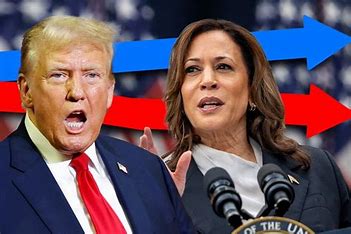As the 2024 U.S. presidential election heats up, the impact on Indian stock markets and export-driven sectors has captured the interest of investors. A Trump win may favor certain industries, while a Harris victory could bring changes to climate and economic policies with significant effects on global markets. Here’s what analysts predict for Indian markets if either candidate wins.
US Election Stakes for Indian Markets
The 2024 election could directly affect India’s information technology (IT), pharmaceutical, textiles, metals, oil and gas, industrials, defense, and utilities sectors. Analysts suggest Trump may hold a slight lead in current polls, but the race remains tight, especially in swing states like Pennsylvania, Georgia, and Arizona.
Sector Analysis: Trump vs. Harris Policy Impact on India
1. IT Services
– Trump: Expected to impose higher tariffs, but may drive hiring at Global Capability Centers (GCCs) in India, benefiting IT midcap firms.
– Harris: A win could mean higher U.S. corporate taxes, potentially limiting tech spending and affecting margins for Indian software exporters.
2. Pharmaceuticals
– Both Parties: Focus on lowering drug costs, benefiting generic volume growth.
– Harris: Push for faster approvals of first-time generics could aid U.S. generic companies.
3. Industrials
– Trump: Plans to boost U.S. manufacturing, potentially strengthening multinational industrial companies like ABB, Siemens, and Honeywell, which have significant ties with Indian suppliers.
– Harris: May lean towards cleaner energy infrastructure, impacting traditional manufacturing favorably.
4. Oil & Gas
– Trump: Favorable for traditional energy with less emphasis on climate costs, benefiting oil and gas stocks in the short term.
– Harris: Could enforce carbon credit costs, impacting oil and gas producers but supporting green energy stocks.
5. Defense
– Trump: Emphasis on a strong military could favor Indian defense companies aligned with U.S. defense contracts, such as Bharat Dynamics and HAL.
– Harris: May prioritize international alliances with a balanced defense spending approach.
6. Metals
– Both Parties: Limited changes expected, as current tariffs on Chinese steel and aluminum remain stable.
7. Textiles
– Trump: Trade barriers with China may create export opportunities for Indian textiles.
– Harris: Likely to support fair-trade policies that may open alternative markets.
8. Utilities
– Trump: Traditional energy focus could lower demand for solar exports.
– Harris: Expected to expand climate initiatives, boosting demand for solar module exports to the U.S.
Stock Market Projections: Republican Sweep vs. Democratic Gains
Ashika Stock Broking notes that a Republican sweep might fuel a short-term rally in U.S. markets, which could spill over positively to India. However, Emkay Global warns that sustaining this rally might be challenging, depending on global earnings momentum. A Democratic sweep, while potentially causing a market correction of 5%, may offer long-term stability with a focus on sustainable growth.
Polling Errors and Swing States
Nomura India highlights the tight polling margins, with errors in swing states potentially swinging the election either way. If Trump outperforms, as he did in 2016 and 2020, it could lead to market adjustments that could affect FPI flows to India.
Bottom Line
The 2024 U.S. election’s impact on Indian markets hinges on who takes office. While Trump may drive short-term rallies with pro-business stances, Harris’s policies could offer more consistent growth through green energy initiatives and climate-focused policies. Investors should watch closely as November 5 approaches, with India’s export-reliant sectors poised to respond to the changing winds of U.S. economic policies.













